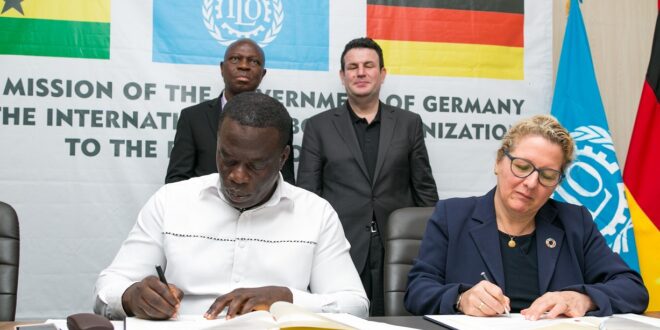Germany wants to recruit more skilled workers from Ghana. Federal Development Minister Svenja Schulze and Federal Labour Minister Hubertus Heil (both SPD) presented an initiative to this effect on Tuesday in Accra during their visit to the African country. The Ghanaian-German Centre for Jobs, Migration and Reintegration in the capital city, which has been supporting Ghanaian deportees and returnees since 2017, will now also provide information on legal migration routes for skilled workers to Germany and Europe. The facility has now been aptly renamed Ghanaian-European Centre for Jobs, Migration and Development.
“Securing skilled labour is securing prosperity for our country,” said Heil. “We must pull out all the stops at home and abroad to attract qualified skilled workers.” At the same time, Schulze emphasised that migration policy is closely linked to development policy.
“If managed correctly, migration holds enormous potential for economic development in our partner countries, but also for us. Together, we can find good solutions for the shortage of skilled workers in Germany and the high youth unemployment in countries like Ghana. Labour migration can strengthen development in the country of origin, for example, through remittances and knowledge transfer.
One area in which there is a particularly high demand in Germany is nursing. According to the World Health Organisation (WHO), however, there is also a critical shortage of health and nursing staff in Ghana. The WHO therefore recommends not to recruit for this sector from countries such as Ghana; private agencies are not allowed to recruit nursing staff in these countries for the German market. Other countries where Germany wants to invest in migration centres are also on the WHO list.
Under the initiative “Centres for Migration and Development”, which is supported by the EU and includes the centre in Accra, the German Ministry of Development wants to invest 150 million euros in the coming years. Further centres are planned in Morocco, Tunisia, Egypt, Jordan, Nigeria, Iraq, Pakistan and Indonesia. Germany will invest ten million euros in the centre in Accra over the next three years, the EU will contribute six million euros.
Ghana has been one of the priority countries of German development co-operation since 2017. Because Ghana is considered a safe country of origin, most Ghanaians who enter Germany illegally are only tolerated and have no prospect of permanent residence status.
By providing opportunities for regular migration through employment, the new policy is expected to discourage irregular migration from Ghana. The Ghanaian-European Centre for Jobs, Migration and Development is expected to function as “the one-stop shop and advice centre” for persons interested in migrating regularly to Germany, Europe or even within West Africa for study or work. The facility will also continue to support returnees from Germany, Europe or elsewhere in their reintegration.
Felix Dappah
 THE AFRICAN COURIER. Reporting Africa and its Diaspora! The African Courier is an international magazine published in Germany to report on Africa and the Diaspora African experience. The first issue of the bimonthly magazine appeared on the newsstands on 15 February 1998. The African Courier is a communication forum for European-African political, economic and cultural exchanges, and a voice for Africa in Europe.
THE AFRICAN COURIER. Reporting Africa and its Diaspora! The African Courier is an international magazine published in Germany to report on Africa and the Diaspora African experience. The first issue of the bimonthly magazine appeared on the newsstands on 15 February 1998. The African Courier is a communication forum for European-African political, economic and cultural exchanges, and a voice for Africa in Europe.


























